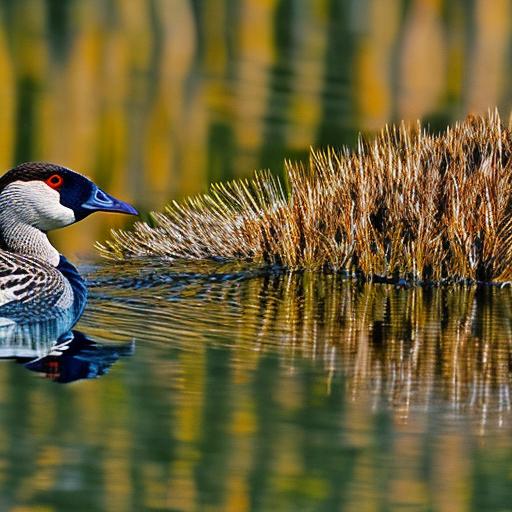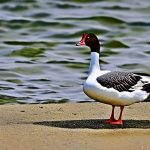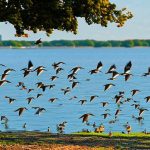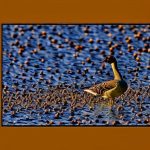Having geese on your property can be a nuisance. They can cause damage to your lawn, leave behind droppings that are unsightly and unsanitary, and even become aggressive towards humans or other animals. Fortunately, there are several methods that can be used to deter geese and keep them off your property.
Key Takeaways
- Geese are social animals and tend to congregate in large groups.
- Physical barriers such as fences and netting can be effective in keeping geese away.
- Visual deterrents like decoys and reflective tape can also discourage geese from settling in an area.
- Loud noises like air horns and predator calls can scare geese away temporarily.
- Planting vegetation that geese dislike, such as prickly bushes, can make an area less attractive to them.
Understanding the behavior of geese
To effectively deter geese, it is important to understand their habits and behavior. Geese are attracted to areas that provide them with food, water, and shelter. They are also social animals and tend to gather in large groups. They are known to return to the same areas year after year, so once they have found a suitable location, they will continue to come back.
Creating physical barriers to deter geese
One effective method of deterring geese is by creating physical barriers that prevent them from accessing your property. There are several types of physical barriers that can be used, including fences, netting, and hedges. Fences should be at least three feet high and have small openings to prevent geese from squeezing through. Netting can be placed over ponds or other bodies of water to prevent geese from landing. Hedges can also be used to create a barrier between your property and areas where geese tend to gather.
Implementing visual deterrents to keep geese away
Visual deterrents can also be effective in keeping geese away from your property. These deterrents work by creating an environment that is unattractive or intimidating to geese. One common visual deterrent is the use of scarecrows or decoy predators, such as plastic owls or coyotes. These decoys should be moved regularly to prevent geese from becoming accustomed to them. Another visual deterrent is the use of reflective objects, such as shiny tape or balloons, which can create a sense of danger for the geese.
Using sound to scare geese off your property
Sound deterrents can be an effective way to scare geese away from your property. There are several types of sound deterrents that can be used, including noise-making devices, such as air horns or whistles, and predator calls. These deterrents should be used intermittently to prevent geese from becoming accustomed to the sound. It is also important to note that sound deterrents may not be effective in all situations, as geese can become habituated to certain sounds over time.
Planting vegetation that geese dislike
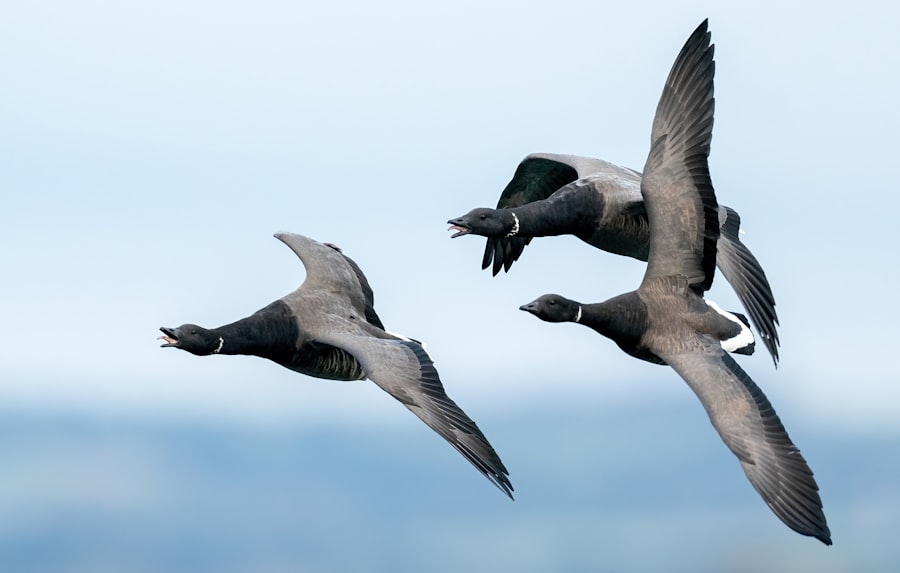
Another method of deterring geese is by planting vegetation that they dislike. Geese prefer open areas with short grass where they can easily spot predators. By planting tall grasses or shrubs, you can create an environment that is less attractive to geese. Some plants that geese tend to avoid include tall fescue, switchgrass, and yarrow. It is important to note that these plants may take some time to establish and may require regular maintenance.
Removing potential food sources for geese
Geese are attracted to areas that provide them with food, so removing potential food sources from your property can help deter them. This includes removing fallen fruit from trees, cleaning up spilled birdseed or pet food, and covering garbage cans securely. It is also important to avoid feeding geese intentionally, as this can encourage them to stay on your property.
Keeping your lawn well-maintained to discourage geese
Maintaining your lawn can also help discourage geese from settling on your property. Geese prefer short grass where they can easily spot predators, so allowing your lawn to grow longer can make it less attractive to them. Regularly mowing your lawn and removing weeds can also help deter geese.
Installing motion-activated sprinklers to deter geese
Motion-activated sprinklers can be an effective way to deter geese from your property. These sprinklers are triggered by movement and spray a burst of water, scaring away the geese. They can be placed near areas where geese tend to gather, such as ponds or lawns. It is important to note that these sprinklers should be used intermittently to prevent geese from becoming accustomed to them.
Using natural predators to keep geese at bay
Using natural predators can be an effective long-term solution for keeping geese at bay. Some natural predators of geese include dogs, foxes, and coyotes. By attracting and maintaining these predators on your property, you can create an environment that is less attractive to geese. This can be done by providing suitable habitat for these predators, such as dense vegetation or nesting boxes.
Seeking professional help for long-term geese control
If you are unable to effectively deter geese on your own, it may be necessary to seek professional help. Professional geese control services have the knowledge and experience to effectively deter geese and keep them off your property. They can assess your property and recommend the best methods for deterring geese based on your specific situation.
In conclusion, there are several methods that can be used to deter geese and keep them off your property. These methods include creating physical barriers, implementing visual deterrents, using sound deterrents, planting vegetation that geese dislike, removing potential food sources, maintaining your lawn, installing motion-activated sprinklers, using natural predators, and seeking professional help. By taking action and implementing these methods, you can effectively deter geese and enjoy a goose-free property.
If you’re looking for effective ways to keep geese out of your yard, you might also be interested in learning about the importance of the right chicken coop door size. A properly sized door can not only prevent geese from entering your yard but also ensure the safety and comfort of your chickens. Check out this informative article on poultrywizard.com that provides valuable insights on choosing the right chicken coop door size: https://poultrywizard.com/keeping-chickens/chicken-coop-door-size/. Additionally, if you’re considering investing in a new chicken coop, the article on “Snaplock Chicken Coop” offers useful information on a secure and convenient option: https://poultrywizard.com/keeping-chickens/snaplock-chicken-coop/.
FAQs
What are some common problems caused by geese in yards?
Geese can cause damage to lawns, gardens, and landscaping by eating plants and leaving droppings. They can also be aggressive towards humans and pets.
What are some natural ways to keep geese out of my yard?
Planting tall grasses or shrubs around the perimeter of your yard can deter geese from entering. You can also use decoys of natural predators, such as coyotes or owls, to scare them away.
What are some non-natural ways to keep geese out of my yard?
Installing physical barriers such as fences or netting can prevent geese from entering your yard. You can also use noise deterrents such as ultrasonic devices or loudspeakers playing predator calls.
Is it legal to harm or kill geese to keep them out of my yard?
No, it is illegal to harm or kill geese without a permit. There are humane ways to deter geese from your yard without causing harm to them.
What should I do if I encounter an aggressive goose?
It is best to slowly back away from the goose and avoid making direct eye contact. Do not run or turn your back on the goose, as this can provoke it further. If the goose continues to be aggressive, seek help from a professional wildlife control service.
Meet Walter, the feathered-friend fanatic of Florida! Nestled in the sunshine state, Walter struts through life with his feathered companions, clucking his way to happiness. With a coop that’s fancier than a five-star hotel, he’s the Don Juan of the chicken world. When he’s not teaching his hens to do the cha-cha, you’ll find him in a heated debate with his prized rooster, Sir Clucks-a-Lot. Walter’s poultry passion is no yolk; he’s the sunny-side-up guy you never knew you needed in your flock of friends!

